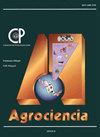草药饲料添加剂(animunin粉®)对哺乳羔羊生长和健康的影响
IF 0.5
4区 农林科学
Q4 AGRICULTURE, MULTIDISCIPLINARY
引用次数: 0
摘要
肠道和呼吸道感染导致羔羊在断奶期间和断奶后死亡,给集约化羊生产系统造成经济损失。这些感染已经用抗生素治疗,但抗生素的使用不当导致了细菌耐药性。植物源次生代谢物可作为羔羊抗生素的替代品。我们推测羊粪蛋白可以改善羔羊断奶期间和断奶后的生产性能和免疫反应。本研究的目的是观察补充Animunin如何影响哺乳羔羊与健康状况和体重变化相关的血液代谢物。试验设计完全随机化,每组分别添加0.0、0.25、0.50和1.0 g d-1的Animunin凝胶帽,持续60 d。随机选取40只25日龄的汉普郡×萨福克公羔(初始体重10.8±2.6 kg)进行处理。第83±2天测定断奶体重(WW)。泌乳期间,除哺乳外,还给羔羊提供预开料和随意饮水。采用SAS GLM程序进行数据分析。复方对大部分血液成分无影响。然而,随着凝胶帽中Animunin剂量的增加,葡萄糖、尿素和肌酐水平下降。与0 g相比,1 g剂量羔羊血液中碱性磷酸酶(ALP)和乳酸脱氢酶(LDH)水平分别提高了39.4%和45.9%。最终体重和日增重不受影响(p >0.05)。综上所述,植物性Animunin具有降血糖作用,但不影响羔羊生长。本文章由计算机程序翻译,如有差异,请以英文原文为准。
EVALUATION OF AN HERBAL FEED SUPPLEMENT (ANIMUNIN POWDER®) IN NURSING LAMBS FOR GROWTH AND HEALTH
Enteric and respiratory infections cause lamb death during and after weaning, resulting in economic losses in intensive ovine production systems. These infections have been treated with antibiotics, but their inadequate use has resulted in bacterial resistance. Plant-derived secondary metabolites can be used as an alternative to antibiotics in lambs. We hypothesized that Animunin could improve lamb performance and immunological response during and after weaning. The objective of this study was to see how Animunin supplementation affected the profile of blood metabolites related to health status and weight changes in nursing lambs. The experimental design was completely randomized, with treatments consisting of supplementation with Animunin gel caps at doses of 0.0, 0.25, 0.50, and 1.0 g d-1 for 60 d. Treatments were assigned at random to 40 male Hampshire x Suffolk nursing lambs (initial body weight (IBW) 10.8±2.6 kg, 25 d old). Weight at weaning (WW) was determined on day 83±2. During lactation, the lambs were offered pre-starter feed and water ad libitum, in addition to nursing. SAS GLM procedure was used to analyze the data. The level of polyherbal mixture had no effect on most blood components. However, as the dose of Animunin in the gel caps increased, glucose, urea, and creatinine levels decreased. In contrast, the levels of alkaline phosphatase (ALP) and lactate dehydrogenase (LDH) in the blood of lambs given the 1 g dose increased by 39.4 and 45.9 %, respectively, compared to lambs given 0 g. The final body weight and daily gain were not affected (p > 0.05). In conclusion, the phytogenic Animunin had hypoglycemic effects while having no affecting lamb growth.
求助全文
通过发布文献求助,成功后即可免费获取论文全文。
去求助
来源期刊

Agrociencia
农林科学-农业综合
CiteScore
0.50
自引率
33.30%
发文量
51
审稿时长
18-36 weeks
期刊介绍:
AGROCIENCIA is a scientific journal created and sponsored by the Colegio de Postgraduados. Its main objective is the publication and diffusion of agricultural, animal and forestry sciences research results from mexican and foreign scientists. All contributions are peer reviewed. Starting in the year 2000, AGROCIENCIA became a bimonthly and fully bilingual journal (Spanish and English versions in the same issue). Since 2007 appears every month and a half (eight issues per year). In addition to the printed issues, the full content is available in electronic format.
 求助内容:
求助内容: 应助结果提醒方式:
应助结果提醒方式:


